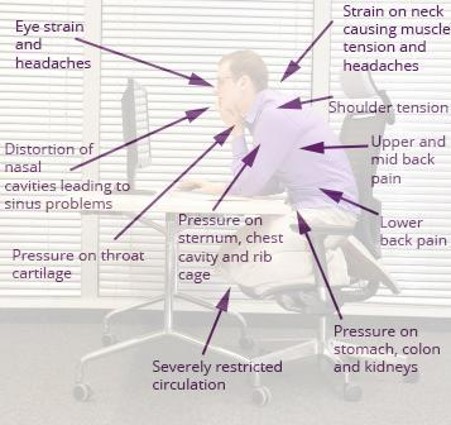DSE stands for Display Screen Equipment
The term Display Screen Equipment (DSE) originally referred to computer screens and laptops but now encompasses tablets, Smartphones, iPads, and touchscreens, so this now applies to most people at some point during their working day.
If you use DSE daily for an hour or more at a time, you qualify as a DSE user. Employer of DSE users have an obligation to comply with The Health and Safety (Display Screen Equipment) Regulations 1992.
The regulations were put in place by the Health & Safety Executive (HSE) to reduce risks from prolonged DSE use. These risks can include:
- Pain in the neck, shoulders, back, arms, wrists and hands
- Fatigue
- Eye strain
The DSE Health and Safety regulations apply to the below categories:
- Fixed workstations
- Mobile workers
- Home workers
- Hot-desking
How is your posture impacting your well-being? You may have already discovered that using a laptop all day without a separate screen or keyboard can cause neck and shoulder tension.
If you’re a DSE user, your employer has a responsibility to carry out DSE assessments to:
- ensure employees’ workstations are set up correctly
- make necessary adjustments to ensure you can adopt a good posture whilst working
- provide training and information to encourage employees to adopt good working practices
At Essential Vitality, we believe that prevention is better than cure. Even minor adjustments to your workstation can reduce or eliminate stress or strain on your body, reduce the likelihood of pain, and lead to a significant impact on productivity and overall well-being.
To find out more about how a DSE Assessment can benefit you and your workplace, visit: Essential Vitality’s DSE Assessments
Further reading:
http://www.hse.gov.uk/msd/dse/index.htm
https://www.ergonomics.org.uk/
http://www.hse.gov.uk/pubns/indg36.pdf



